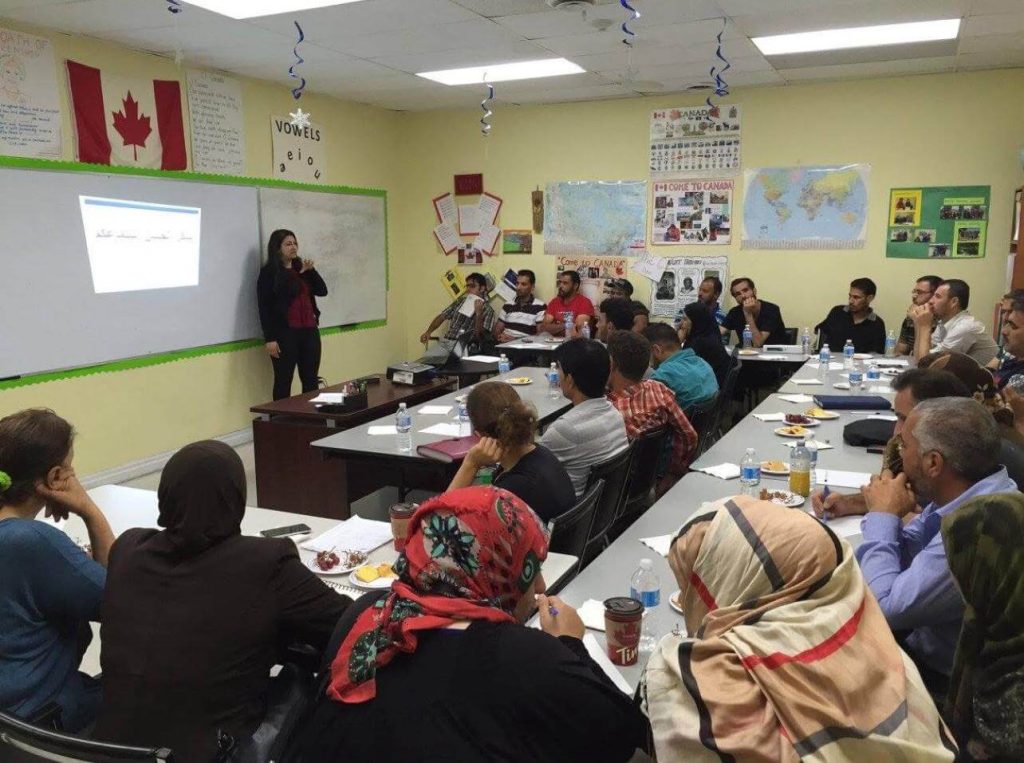Listen to the article
Journalist Brings Media Literacy to Immigrant Communities in Canada
Mona Awwad still remembers the vulnerability of starting over in a new country. Born in Kuwait to a Jordanian family of Palestinian origins, she fled the Gulf War at age 5, later moved to the United States, and finally found a permanent home in Canada in 2015.
This personal experience has become the foundation of her work as a media literacy trainer, focusing specifically on immigrant communities who often face unique challenges navigating information in their new homes.
“I witnessed firsthand how newcomers can be vulnerable to disinformation, especially when it affects critical areas like health, employment, or housing,” Awwad explains. “I wanted to give my community the tools to manage this reality, and to make sure that those who often have the least access to media literacy training are not left behind.”
Awwad is one of 27 trainers who participated in the International Center for Journalists’ (ICFJ) Disarming Disinformation initiative, a three-year program supported by the Scripps Howard Foundation. The initiative partners with MediaWise from the Poynter Institute to develop media literacy programming aimed at slowing the spread of false information.
As a freelance journalist and immigration policy researcher focusing on the Middle East and North Africa, Awwad recognized a critical gap in her immigrant community’s ability to navigate the complex information landscape in Canada. Though she herself works in media, Awwad had not received formal media literacy training until the ICFJ program.
“The program reshaped how I see media literacy,” she says. “It’s not only about spotting false information or knowing how to verify sources. It’s a broader mindset. A daily habit of questioning, checking, and reflecting on the information we consume.”
Drawing on her existing connections with settlement and newcomer support groups in Canada, Awwad has already reached nearly 80 recent immigrants through her workshops, using both Arabic and English to make the content accessible. She developed a unique framework called QIRAA—which means “reading” in Arabic—to help participants remember key verification steps: Question, Identify, Research, Acknowledge and Act.
What makes Awwad’s approach particularly effective is her understanding of the specific vulnerabilities immigrants face. Many workshop participants initially felt overwhelmed upon realizing how pervasive disinformation is in their daily lives. Through practical exercises, Awwad focuses on high-impact scenarios like identifying rental fraud and false advertisements—common scams targeting newcomers.
Her workshops revealed another crucial insight: many immigrants need basic digital literacy skills before they can effectively apply media literacy concepts. UNESCO defines digital literacy as “the confident and critical use of a full range of digital technologies for information, communication and basic problem-solving,” which differs from media literacy’s focus on evaluating information content.
The impact of Awwad’s training has already been documented. One participant reported using verification techniques learned in the workshop to help her elderly father avoid a rental scam. Another began volunteering at a local community center to share media literacy skills with others, creating a multiplier effect.
This ripple effect demonstrates the power of targeted media literacy training in vulnerable communities. According to ICFJ, the 27 trainers in the Disarming Disinformation program have collectively reached more than 3,200 people, building resilience against false information at the community level.
Awwad plans to expand her work with additional workshops specifically tailored to address disinformation related to employment, housing, and health—areas where immigrants are particularly susceptible to harmful misinformation. She’s also developing a tiered approach that first establishes digital literacy foundations before advancing to more complex verification techniques.
For Awwad, this work represents a deeply personal mission that connects to her own immigration journey across Kuwait, Jordan, the United States, and finally Canada.
“I know how vulnerable newcomers can be to confusion, misinformation, and even scams when trying to settle,” she reflects. “Helping them navigate information with more confidence feels deeply personal to me. It’s my way of giving back in the same way I once needed support.”
As disinformation continues to pose threats to social cohesion and democratic processes worldwide, targeted grassroots programs like Awwad’s demonstrate how media literacy can build resilience in communities most at risk of harm from false information.
Verify This Yourself
Use these professional tools to fact-check and investigate claims independently
Reverse Image Search
Check if this image has been used elsewhere or in different contexts
Ask Our AI About This Claim
Get instant answers with web-powered AI analysis
Related Fact-Checks
See what other fact-checkers have said about similar claims
Want More Verification Tools?
Access our full suite of professional disinformation monitoring and investigation tools




7 Comments
I’m curious to learn more about the specific challenges that newcomers face when it comes to processing information in their new countries. This seems like an important issue to address.
Providing targeted media literacy training for immigrant groups is a smart approach. Equipping them with the tools to identify misinformation will empower them in their new homes.
Absolutely. Giving people the ability to critically evaluate information is key to making informed decisions and avoiding the pitfalls of misinformation.
It’s admirable that this educator is drawing on her own experiences as an immigrant to develop tailored media literacy programs. That personal connection must make a big difference.
Agreed. Her firsthand understanding of the immigrant experience likely allows her to create more relevant and impactful training for these communities.
It’s great that this educator is helping newcomers in Canada learn to navigate the complex information landscape. Media literacy is so important, especially for vulnerable communities.
Navigating a new information landscape can be daunting for anyone, let alone those who are also adjusting to a new country and culture. This initiative seems like a valuable resource.